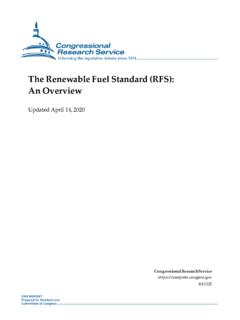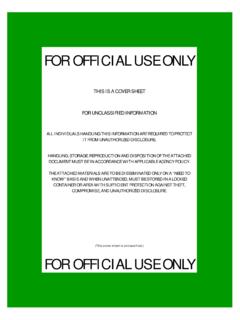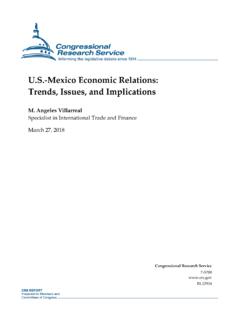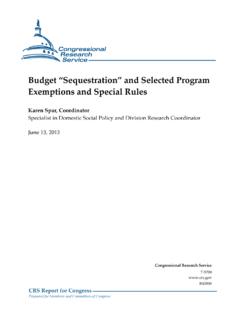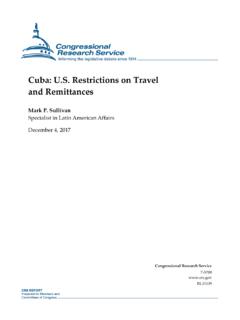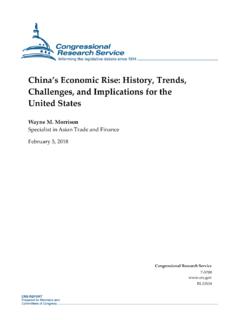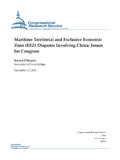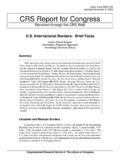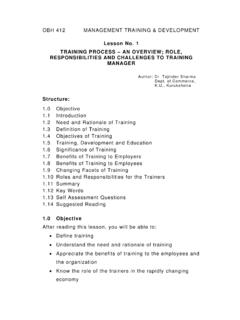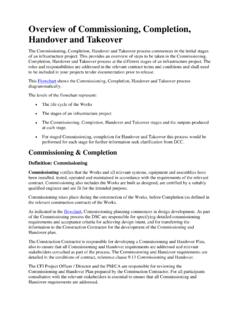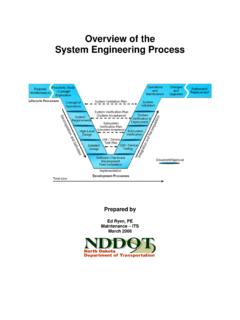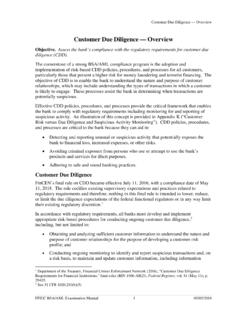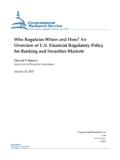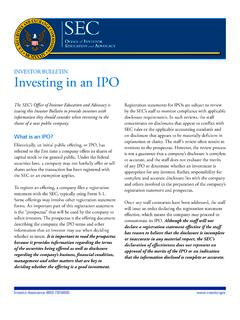Transcription of The Vacancies Act: A Legal Overview
1 The Vacancies Act: A Legal Overview Updated May 28, 2020 Congressional Research Service R44997 The Vacancies Act: A Legal Overview Congressional Research Service Summary The Federal Vacancies Reform Act of 1998 ( Vacancies Act) generally provides the exclusive means by which a government employee may temporarily perform the nondelegable functions and duties of a vacant advice-and-consent position in an executive agency. Unless an acting officer is serving in compliance with the Vacancies Act, any attempt to perform the functions and duties of that office will have no force or effect.
2 The Vacancies Act limits a government employee s ability to serve as an acting officer in two primary ways. First, the Vacancies Act provides that only three classes of people may serve temporarily in an advice-and-consent position. As a default rule, the first assistant to a position automatically becomes the acting officer. Alternatively, the President may direct either a senior official of the agency or a person serving in any other advice-and-consent position to serve as the acting officer. Second, the Vacancies Act limits the length of time a person may serve as acting officer: a person may serve either (1) for a limited time period running from the date that the vacancy occurred or (2) during the pendency of a nomination to that office.
3 The Vacancies Act is primarily enforced when a person who has been injured by an agency s action challenges the action based on the theory that it was taken in contravention of the Act. There are, however, a few key limitations on the scope of the Vacancies Act. Notably, the Vacancies Act has largely been interpreted to govern the ability of a person to perform only those functions and duties of an office that are nondelegable. Unless a statute or regulation expressly specifies that a duty must be performed by the absent officer, that duty may likely be delegated to another government employee.
4 In other words, delegable job responsibilities are outside the purview of the Vacancies Act. In addition, if another statute expressly authorizes acting service, that other statute may render the Vacancies Act nonexclusive, or possibly even inapplicable. This report first describes how the Vacancies Act operates and outlines its scope, identifying when the Vacancies Act applies to a given office and which offices are exempt from its provisions. The report then explains who may serve as an acting officer and for how long, focusing on the limitations the Vacancies Act places on acting service.
5 Next, the report discusses the Vacancies Act s enforcement mechanisms. Finally, the report turns to evolving Legal issues regarding the application of the Vacancies Act, including a discussion of how other federal laws may limit the Act s reach. Specifically, the report concludes by examining the interaction of the Vacancies Act with agency-specific statutes, the ability to delegate the duties of a vacant office, and constitutional considerations. The Vacancies Act: A Legal Overview Congressional Research Service Contents Background .. 1 Scope and Operation of the Vacancies Act.
6 1 Which Offices? .. 3 What Are the Functions and Duties of an Office? .. 6 Vacancies Act Limitations on Acting Service .. 9 Who Can Serve as an Acting Officer?.. 10 Ability to Serve If Nominated to Office .. 11 For How Long? .. 12 Consequences of Violating the Vacancies Act .. 15 Evolving Legal Issues .. 19 Exclusivity of the Vacancies Act .. 19 Delegability of Duties .. 24 Constitutional Considerations .. 27 Figures Figure 1. Two Limited Periods of Service .. 13 Figure 2. Period of Service After Submission of Nomination .. 14 Contacts Author Information.
7 32 The Vacancies Act: A Legal Overview Congressional Research Service 1 Background The Appointments Clause of the Constitution generally requires high-level officers of the United States to be appointed through nomination by the President, with the advice and consent of the However, appointment to these advice-and-consent positions can be a lengthy process, and officers sometimes unexpectedly vacate offices, whether by resignation, death, or other absence, leaving before a successor has been chosen. In particular, there are often a large number of Vacancies during a presidential transition, when a new President seeks to install new officers in important executive In the case of such a vacancy, Congress has long provided that individuals who were not appointed to that office may temporarily perform the functions of that Generally, to serve as an acting officer for an advice-and-consent position, a government officer or employee must be authorized to perform the duties of a vacant office by the Federal Vacancies Reform Act of 1998 ( Vacancies Act).
8 4 The Vacancies Act allows only certain classes of employees to serve as an acting officer for an advice-and-consent position,5 and specifies that they may serve for only a limited If a covered acting officer s service is not authorized by the Vacancies Act, any attempt by that officer to perform a function or duty of a vacant office has no force or effect. 7 This report first describes how the Vacancies Act operates and outlines its scope, identifying when the Vacancies Act applies to a given office and which offices are exempt from its provisions. The report then explains who may serve as an acting officer and for how long, focusing on the limitations the Vacancies Act places on acting service.
9 Next, the report discusses how the Vacancies Act is enforced. Finally, the report turns to evolving Legal issues regarding the application of the Vacancies Act, including a discussion of how other federal laws may limit the Act s reach. Specifically, the report concludes by examining the interaction of the Vacancies Act with agency-specific statutes, the ability to delegate the duties of a vacant office, and constitutional considerations. Scope and Operation of the Vacancies Act The Vacancies Act generally provides the exclusive means for temporarily authorizing an acting official to perform the functions and duties of any office of an Executive agency.
10 For which 1 CONST. art. II, 2, cl. 2 ( [The President] shall nominate, and by and with the Advice and Consent of the Senate, shall appoint .. all other Officers of the United States, whose Appointments are not herein otherwise provided for, and which shall be established by Law: but the Congress may by Law vest the Appointment of such inferior Officers, as they think proper, in the President alone, in the Courts of Law, or in the Heads of Departments. ). If the vacancy exists during the Recess of the Senate, the Constitution also allows the President to appoint an officer to serve until the End of [the Senate s] next Session.
